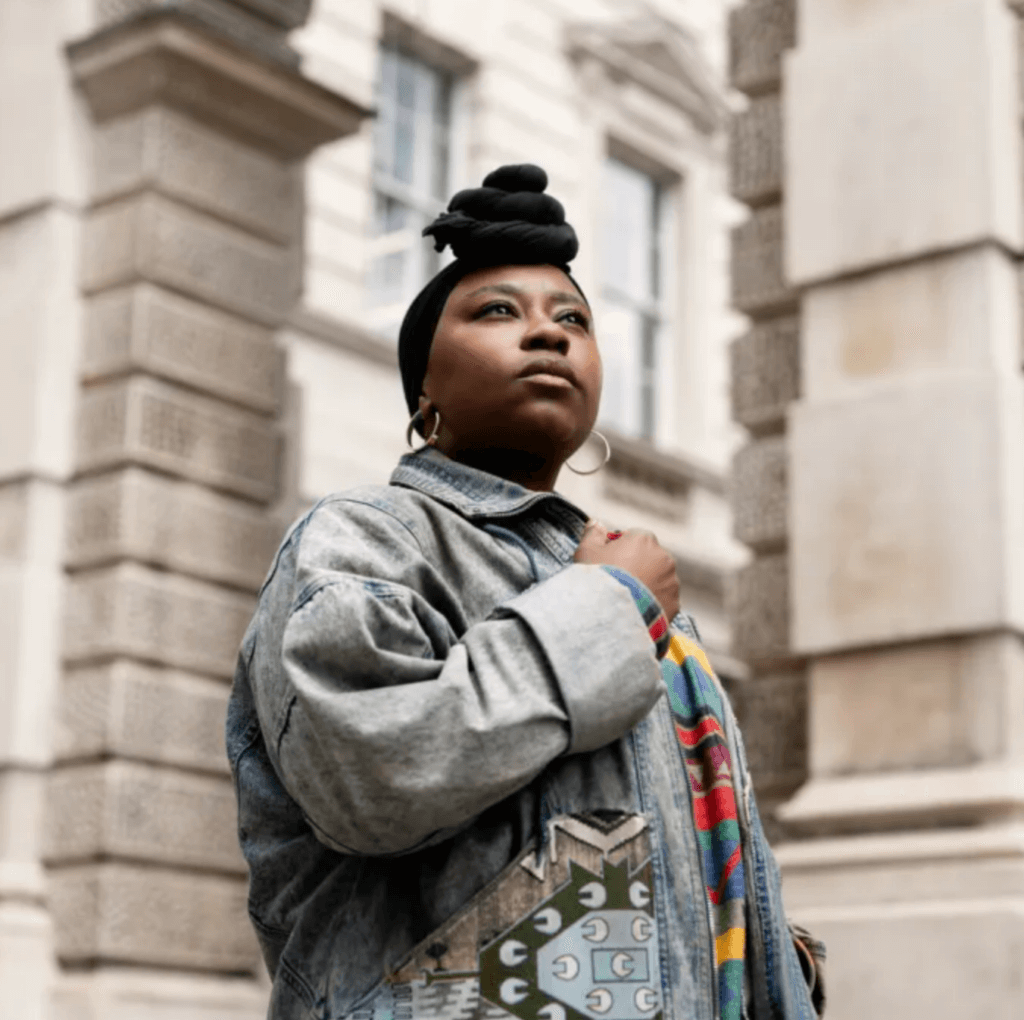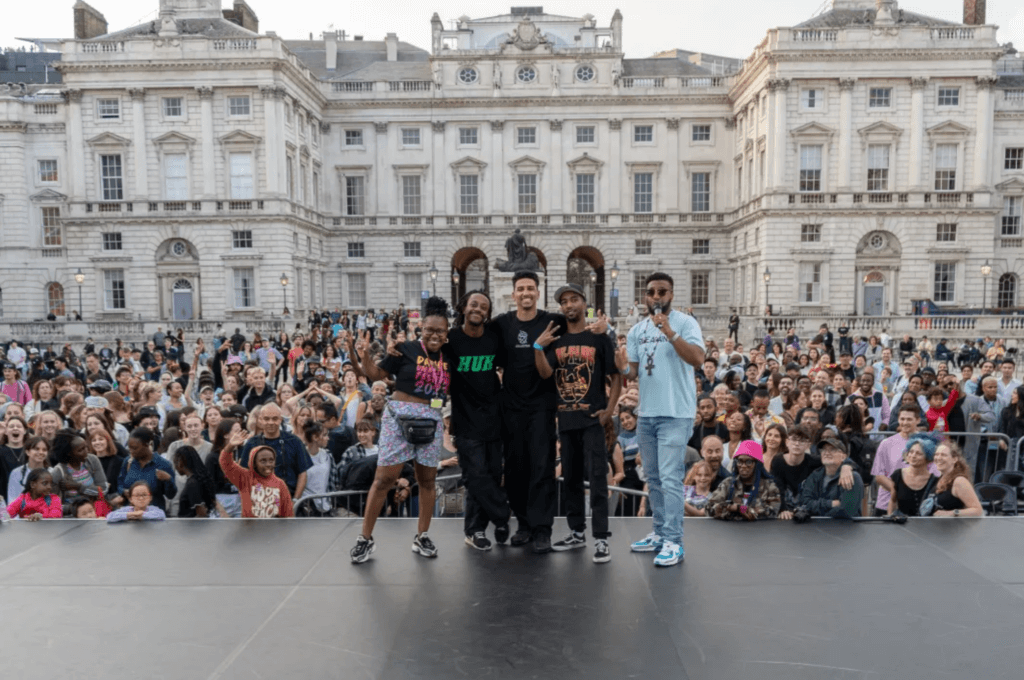
Photo Credit — Camilla Greenwell
Returning for its second year, London Battle is set to take over Somerset House’s iconic courtyard with a dynamic day of dance showcases, workshops, live DJs, and an epic outdoor party. Curated by renowned choreographer Jade Hackett, this year’s event celebrates breaking’s debut at the 2024 Paris Olympics and culminates in a thrilling head-to-head dance battle between London’s four corners. With Hackett’s rich experience with hip hop giants like Boy Blue and ZooNation, attendees will judge which neighborhood—north, south, east, or west—brings the best dance flavor. In this interview, Jade Hackett shares her vision, challenges, and excitement for London Battle 2024.
London Battle is set to take over Somerset House’s iconic courtyard. Can you tell us what inspired this year’s event and the head-to-head battle format?
Hiphop, by definition, is the genre of rebellion. Made by the very people that a historical landmark such as Somerset House would have many years ago shunned out of this space. London Battle aims to change that narrative and produce an event that celebrates London as one of the most diverse cities in the world. Bringing people together in a space that we are breaking down the historic barriers for and using the most universal cultural genre in the world to do it. A day of love and inclusion for all.
Breaking is making its debut at the Paris Olympic Games this year. How significant is this moment for the dance community, and how do you see it influencing the future of dance events like Dance Umbrella?
It’s such a wonderful thing to see Breaking in the Olympics. The hybrid style where calisthenic athleticism meets dance has long been a movement quality that deserved this level of recognition, comparable to gymnastics or the 100 metre sprinters.
It brings more visibility to our craft. Making others that might not have access to hiphop dance understand the true magic of our dance and thus companies, like Dance Umbrella, are able to advocate for the culture by providing more platforms for us as the demand to consume this artform becomes much higher.
You have a rich history with some of the UK’s leading hip hop dance theatre companies. How have your experiences with Boy Blue and ZooNation shaped your vision for London Battle 2024?
What both of those companies have taught me is to think about shows on a bigger scale. Finding ways to make smaller events feel like big productions. I encourage having a great core creative and production team that both these titan companies use to build masterful pieces of work. Also the idea of building a legacy for the dance community. Like both these dance companies and their productions, I’d love for London Battle’s foundations to be laid enough that it can exist passed me and it’s something that possibly the younger generation could take over and keep it pushing for the dance scene throughout the UK.
Curating such a large event must come with its challenges. Can you share some of the biggest obstacles you’ve faced in bringing this event to life and how you’ve overcome them?
Dancers/Performers are literally magicians with their bodies. They are able to do some of the most fantastic things that defy gravity. But the body is equally fragile and with more high impact movement, comes more opportunity for injuries and accidents. Combating that has been a challenge at times as the wellbeing of the performer must take priority in such situations.
With this being an outdoor event, weather will always be taken into account. Being and the whim of British weather is something that is also difficult and is something that could also potentially be a challenge that we’ll have to navigate when we are closer to the event.
London Battle 2024 promises to bring together exciting talent from all corners of London. What criteria did you use to select the participants for the head-to-head battles?
The concept of the battle encourages working with London based dancers that cover a wide range of hiphop dance styles, and give us diversity within representation, bearing in mind that hiphop can usually be quite a male dominated genre. It’s a massive jigsaw puzzle in putting the battle together making sure that the performers meet the criteria that makes that event feel both authentic and entertaining.
As someone who has worked extensively in theatre and commercial projects, how do you balance the artistic and entertainment aspects of an event like London Battle?
I wouldn’t say I balance them as that might suggest that I try to compartmentalise them. I’d rather say how I’m merging my artistic approach with my entertainment outlook. For example, I have a vision for London Battle that emulates or is inspired by Ernie Barnes famous painting ‘Sugar Shack’. When looking at that picture, the thing that strikes me the most is that when you take the people out of the image, the space is just a wooden structure that has no life. The energy of the picture comes completely from the people dancing. The colours of the fabrics, the motion in the clothes and musicians and complete joy on all their faces. I want to recreate that energy. Allowing audiences to both be highly entertained by awesome movement but also have the access to be able to take part in all the workshops too.
When I stand back, I want to see that picture come to life.
To see the art in the events canvas.
Your career includes performances in theatre productions like The Mad Hatter’s Tea Party and Some Like it Hip Hop. How do these theatrical experiences influence your approach to curating a dance event?
It’s the journey of these productions. Having a solid beginning, middle and end to these stories means that I’m trying to structure the event with the same narrative arch. Starting the event with workshops, peppering performance within it too and peaking with the main battle event and ending it with the final London Battle summer party jam feels like a great day that keeps growing. I want audiences to be taken on a journey of dance throughout the whole day and that they will enjoy spending the entire day with us.
You’ve been part of major events like the London Olympics and Baku European Games ceremonies. How do these high-profile experiences prepare you for organizing an event at Somerset House?
The main thing that I took from these experiences was the excitement that builds as the event gets closer. Olympics in London was something that had the whole city buzzing and especially all the changes in East London which housed the Olympics in general. We’re aiming our marketing to generate the same excitement in the lead up to this event. To feel excited about attending a growing dance festival and wanting to represent for the area of London that they are from.

Photo Credit — Richard Thompson
This is your second year curating London Battle with Dance Umbrella. What lessons did you learn from last year’s event, and how have they impacted your planning and execution for this year?
One thing that really became apparent is that London Battle is an event that people are craving. It lands within the summer season which was a hole in the market as there aren’t many big summer festivals for dance. But with the rising costs of living, more and more people are having to have more ‘staycations’ within the city rather than expensive holidays abroad and want things to do here in the city, especially things that are family friendly.
With London Battle being free, it opens the event for all to enjoy and doesn’t exclude those that financially wouldn’t be able to afford it if we put on a big price tag for tickets.
I think the business model that we therefore created last year went very well and are trying to take that model again to perfect the product rather than making massive changes as of yet. As they say, ‘if it ain’t broke, don’t try to fix it’. I think it’s important that more people get to experience the original format and who knows, in years to come, should London Battle still be going by then, we’ll be able to evolve it because the events foundation is strong.
Finally, what message do you hope to convey through London Battle 2024, and what do you hope attendees take away from the experience?
Pride in our communities again. With all the political unrest and elections happening all over the world at the moment, the idea of community is ever more divided and strained. I want people to come to a place and dance next to a stranger and encourage them. For people of all ages and abilities to feel equally ‘dope’ taking dance lessons without judgement. To meet old friends that you might not have seen in a long time and stand in a corner whilst eating together to catch up with the backdrop of dancing energy all around them. To marvel at the immense talent that our city holds and be inspired to want to try and go to classes and maybe train in hiphop dance that they’ve never tried before. To watch entertainment live, in the flesh, and not through a phone.
To just be human.
A courtyard full of humans just, enjoying life. That’s what I want.
The London Battle takes place at Somerset House, London on August 17th 2pm — 8.30pm
For more info visit : www.somersethouse.org.uk/whats-on/summer-in-the-courtyard-2024/london-battle
